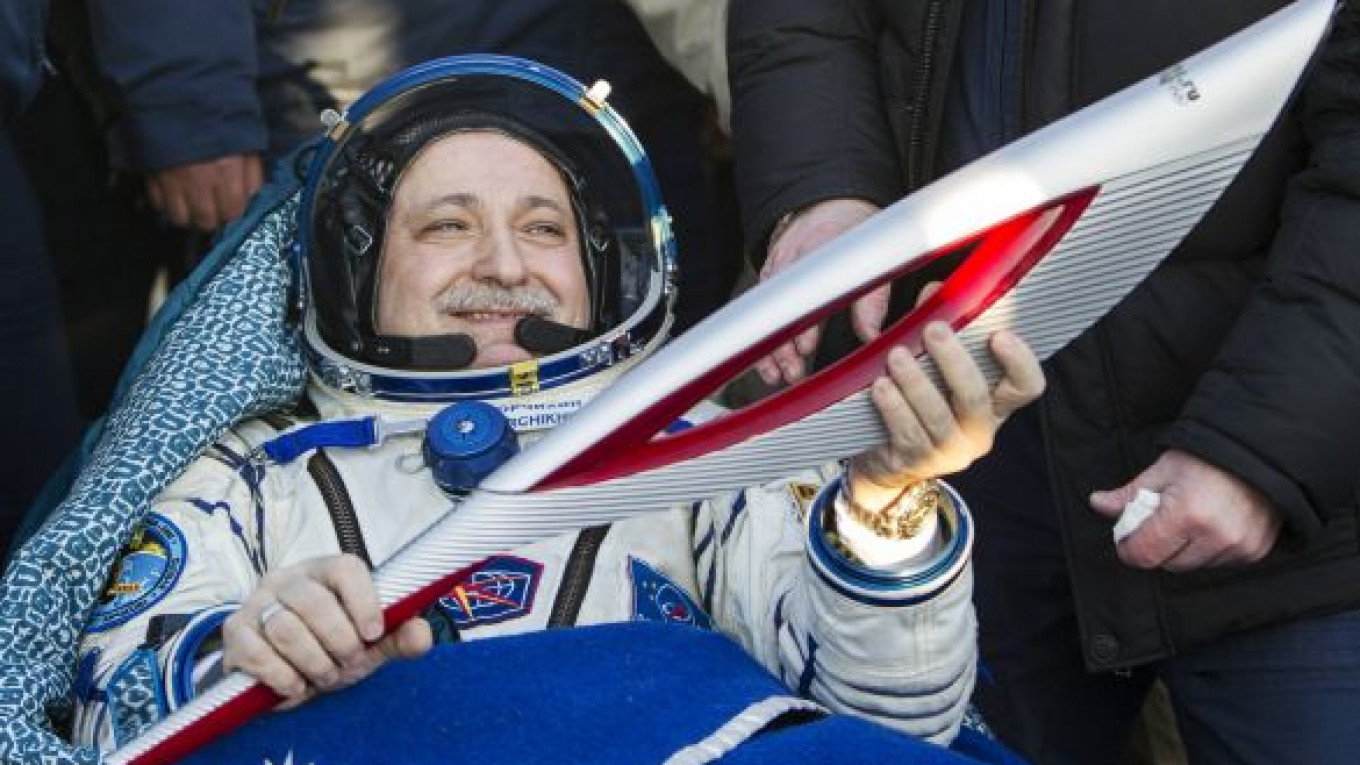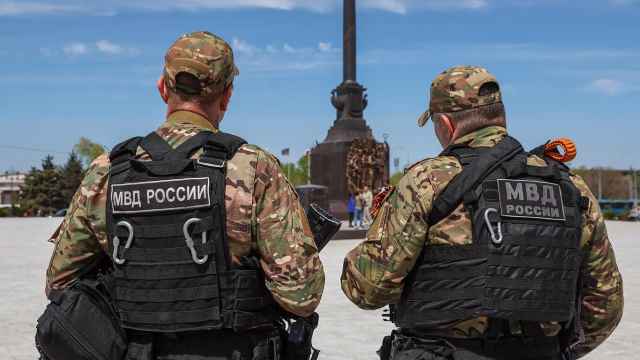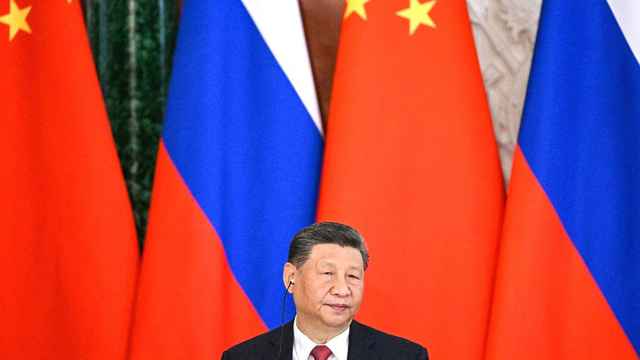NEAR ZHEZKAZGAN, Kazakhstan — A Russian spacecraft brought three astronauts and the Olympic torch back to Earth on Monday after the torch was taken on its first spacewalk in the run-up to the 2014 Winter Games in Sochi.
Russia's Fyodor Yurchikhin beamed as he held up the silver-and-grey torch alongside American Karen Nyberg and Italian Luca Parmitano on the Kazakh steppe after returning from the International Space Station after a 166-day mission.
Slowed by parachutes and braking rockets fired to soften the impact, their Soyuz TMA-09M capsule landed on schedule at 8:49 a.m. after a 3 1/2 hour descent.
"The Olympic torch is home after a four-day journey," a NASA Television announcer said after the flawless descent through a cloudless sky and a "bull's-eye touchdown" in the tall tawny brush of central Kazakhstan, near the remote town of Zhezkazgan.
President Vladimir Putin, who has been in power since 2000, has staked his reputation on a successful Olympics. His image abroad has been damaged by what critics say is a clampdown on dissent, and a law banning homosexual "propaganda" among minors.
The torch was unlit throughout the space voyage, for safety reasons. That also precluded the possibility that the flame could fail — a problem that has occurred dozens of times, including an incident captured live on national television in which the torch went out in the Kremlin minutes after Putin presided over the start of the relay.
Cosmonauts Oleg Kotov and Sergei Ryazansky took it with them on a spacewalk on Saturday, posing outside the orbiting station with the first Olympic torch taken into the vacuum of space.
After their return to Earth, Yurchikhin, Nyberg and Parmitano were pulled through the hatch of the cramped capsule, carried to chairs and covered with thick blankets against the -4 Celsius cold outside.
The torch was then handed to a Sochi 2014 official and flown by helicopter — separately from the three space travelers — to the provincial capital Karaganda.
The torch taken on the spacewalk will be used to light the flame at the Olympics in February in Sochi, a Russian resort city on the Black Sea. The torch was taken into space in 1996 and 2000 but had not previously been outside the space station.
In Karaganda, Yurchikhin, Nyberg and Parmitano were given traditional Kazakh robes and chocolates with their pictures on the boxes. Nyberg felt unwell and skipped a news conference.
"Space is a serious thing," Yurchikhin said. "It affects different bodies and different people in different ways."
Russia cast the spacewalk as part of its pre-Sochi torch relay, a record-breaking trek meant to show off the country's size, diversity and post-Soviet achievements, but the 65,000 kilometer relay continued separately on the ground.
Since Putin held a torch aloft in Red Square on Oct. 6, bearers have taken the Olympic flame to the North Pole and will bring it to Europe's highest peak, Mount Elbrus, in the longest torch relay before any Winter Games.
The torch was taken Thursday to the space station, a $100 billion project of 15 nations, by Japanese astronaut Koichi Wakata, American Rick Mastracchio and Russian Mikhail Tyurin.
The returning crew also brought back a piece of a spacesuit worn by Parmitano that may have been responsible for a leak that caused his helmet to fill with water, forcing an emergency end to NASA's last spacewalk on July 16.
The torch display was a success, but other tasks on the nearly six-hour spacewalk on Saturday did not go as well.
The cosmonauts were unable to fold up an antenna from an experiment involving predicting seismic events such as earthquakes, or to reposition a platform designed to anchor astronauts' legs when they work outside the station.
The Olympic flame on Tuesday is set to travel to Anadyr, the capital of the far eastern Chukotka autonomous district, which will be the torch relay's northern-most and eastern-most point.
The flame will make another stop Tuesday in the Kamchatka region town of Yelizovo, located about 30 kilometers north of the regional capital, Petropavlovsk-Kamchatsky.
Over the weekend, about 70 people took the Olympic torch through the streets of Magadan, a far eastern city notorious for being the main transit point for a massive gulag camp in Soviet times.
A Message from The Moscow Times:
Dear readers,
We are facing unprecedented challenges. Russia's Prosecutor General's Office has designated The Moscow Times as an "undesirable" organization, criminalizing our work and putting our staff at risk of prosecution. This follows our earlier unjust labeling as a "foreign agent."
These actions are direct attempts to silence independent journalism in Russia. The authorities claim our work "discredits the decisions of the Russian leadership." We see things differently: we strive to provide accurate, unbiased reporting on Russia.
We, the journalists of The Moscow Times, refuse to be silenced. But to continue our work, we need your help.
Your support, no matter how small, makes a world of difference. If you can, please support us monthly starting from just $2. It's quick to set up, and every contribution makes a significant impact.
By supporting The Moscow Times, you're defending open, independent journalism in the face of repression. Thank you for standing with us.
Remind me later.






